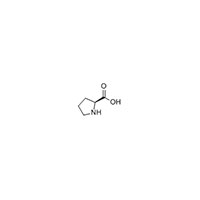Synonyms
(-)-Proline
BYL719
Proline
Proline, L-
(-)-(S)-proline
(2S)-proline
pyrrolidine-2-carbonic acid
(2S)-2-Pyrrolidinecarboxylic acid
(S)-2-Carboxypyrrolidine
(-)-2-Pyrrolidinecarboxylic acid
2-Pyrrolidinecarboxylic acid
Product Description
Introduction to L-Proline as a Food-grade Additive
L-Proline is an amino acid commonly found in many types of protein, especially in collagen. It is used
as a food-grade additive in a variety of processed foods, such as baked goods, dairy products, and
supplements, due to its unique properties and benefits. This article will explore the properties,
functions, and applications of L-Proline in food.
Properties of L-Proline
L-Proline is a non-essential amino acid, which means that it can be synthesized by the human body. It is
also an alpha-amino acid, which means that it has an amino group and a carboxyl group attached to the
same carbon atom. L-Proline is a white crystalline powder that is soluble in water, and its molecular
formula is C5H9NO2. It has a sweet taste and a slightly bitter aftertaste.
Functions of L-Proline in Food
L-Proline has several important functions in food, including:
Flavor enhancer: L-Proline can enhance the flavor of food by providing a slightly sweet taste and a mild
umami flavor.
Stabilizer: L-Proline can stabilize the structure of proteins, which helps to improve the texture and
appearance of food products.
Antioxidant: L-Proline has antioxidant properties that can help to protect food products from oxidation,
which can lead to spoilage and off-flavors.
Nutrient: L-Proline is a nutrient that is important for collagen synthesis, wound healing, and immune
function.
Applications of L-Proline in Food
L-Proline has a wide range of applications in the food industry, including:
Baked goods: L-Proline can be used in baked goods such as bread and cakes to improve texture, increase
volume, and extend shelf life.
Dairy products: L-Proline can be added to dairy products such as yogurt and cheese to improve texture
and stability.
Meat products: L-Proline can be used as a curing agent in meat products such as sausages to improve
flavor and texture.
Supplements: L-Proline supplements are available in tablet, capsule, and powder form, and are used to
support collagen synthesis, wound healing, and immune function.
Conclusion
L-Proline is a versatile food-grade additive that provides unique properties and benefits to a wide
range of food products. Its functions as a flavor enhancer, stabilizer, antioxidant, and nutrient make
it an important ingredient in many processed foods and supplements. Its applications in baked goods,
dairy products, meat products, and supplements demonstrate its versatility in the food industry.





